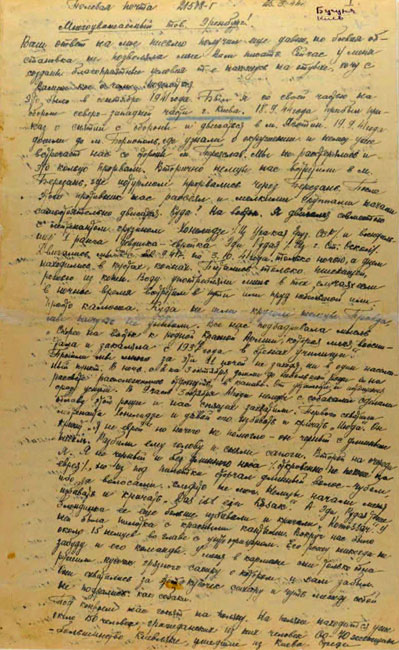Semion Grinshpun was born in Podolia in 1917. He was drafted into the Red Army in Mogilev-Podolskii in 1937. After completing a military academy he became a combat engineer officer. He was at the front from the very beginning of the Soviet-German war. In September 1941 Grinshpun was captured but succeeded in concealing the fact that he was a Jew and, thus, avoided being immediately shot. He later described this episode in a letter to Ilya Ehrenburg:
"…they first grabbed hold of Lieutenant Khonelidze and began to beat him, shouting 'Jude!' He cried 'I am not a Jew' but it didn't help. He had dark hair and a long nose. They smashed his head and then took his boots. I was next in line. I don't have dark hair or a long nose (I don't look like a Jew) but a lock of hair stuck out from under my army cap since under those conditions my hair wasn't presentable (I could hardly arrange for a haircut). The Germans began to beat me and shot 'Das ist ein Kosak!'…"
Grinshpun was sent from one POW camp to another. In December 1941 he succeeded in escaping. On April 24, 1942, after wandering through Nazi occupied territory, he managed to cross the front lines and rejoin the Red Army. In his letter to Ilya Ehrenburg Grinshpun wrote: "April 24 was a special day in my life. I succeeded in breaking out of imprisonment. That was the day when I could, finally, admit to my real name – Grinshpun. When I was wandering around in Ukraine [trying to reach the front] I presented myself as Grinenko, when I was in the Russian Republic I went by the name Grinev. Since April 24, 1942 I am once again a fighter in my native army of liberation."
In October 1943 Senior Lieutenant Grinshpun was award a medal "For Combat Merit." In July 1944, by then a captain, Grinshpun received a second combat medal, the Order of the Patriotic War, 1st class. During preparations for the Red Army's advance into Belorussia 16 pontoon bridges and 18 bridges were constructed by troops under his command as regimental engineer.
Letter from Semion Grinshpun to Ilya Ehrenburg
In his March 26, 1944 letter to Ilya Ehrenburg Grinshpun wrote:
"Comrade Ehrenburg! I may be wrong but I wonder about the following:
Wouldn't it be a good idea to form Jewish [military] units along with other ethnic ones? I am sure that the Jews would fight against the fascists with a ten-fold hatred – as patriots of our Homeland and as avengers of the blood of their closest of kin – their brothers, sisters, fathers, mothers, wives, and children. Is there a single Jew who, in addition to the general Soviet account that we have to settle against the fascists, does not have as well a personal account to settle against the fascist monsters?
It should be noted that this was not an isolated case. The question of establishing Jewish units was raised by many Jews who served in the Red Army."
From: Mordechai Altshuler, Yitzhak Arad, and Shmuel Krakowski, eds., Sovetskie evrei pishut Il'e Erenburgu(Soviet Jews Write to Ilya Ehrenburg), Jerusalem, 1993, p. 132.







